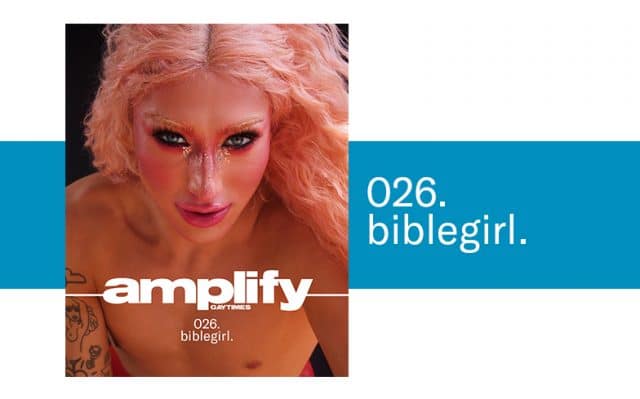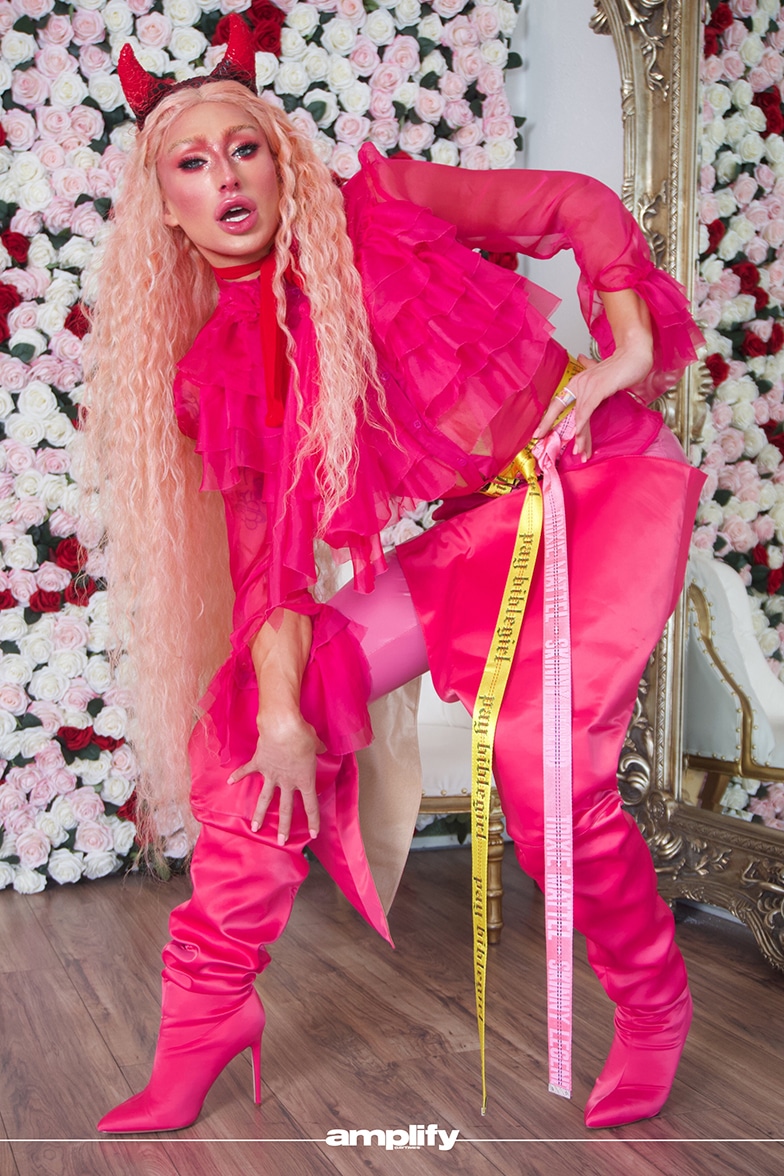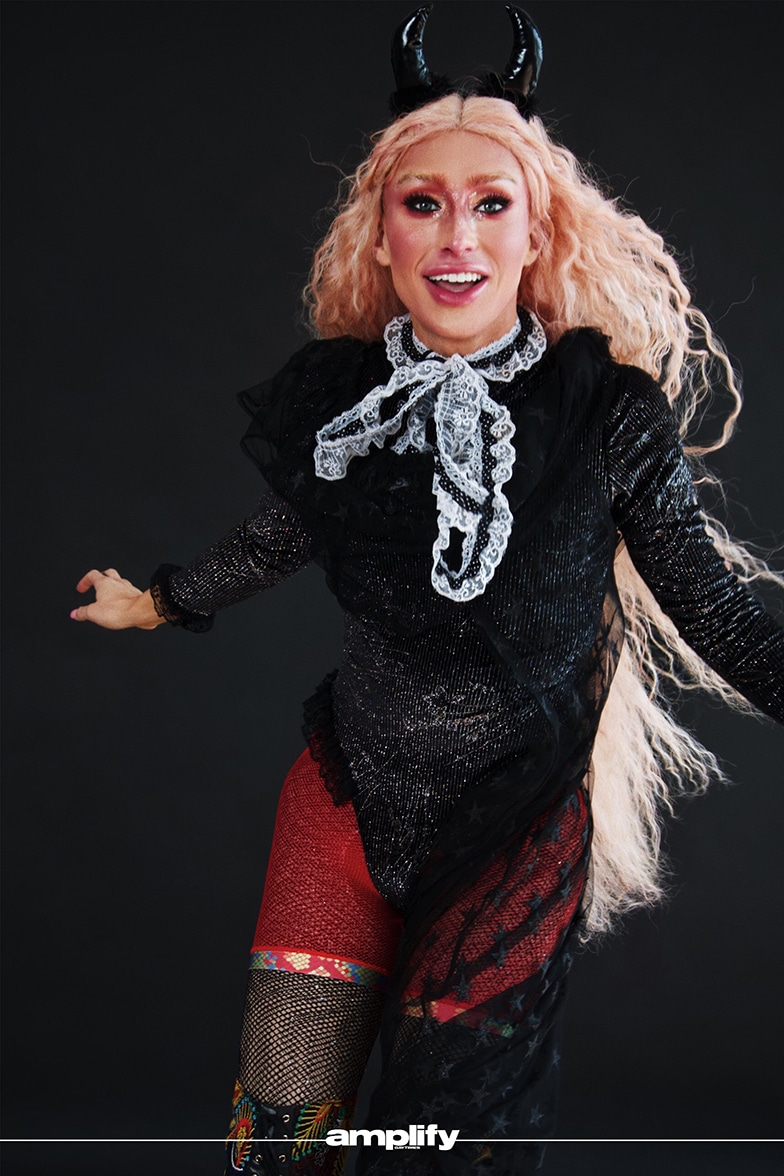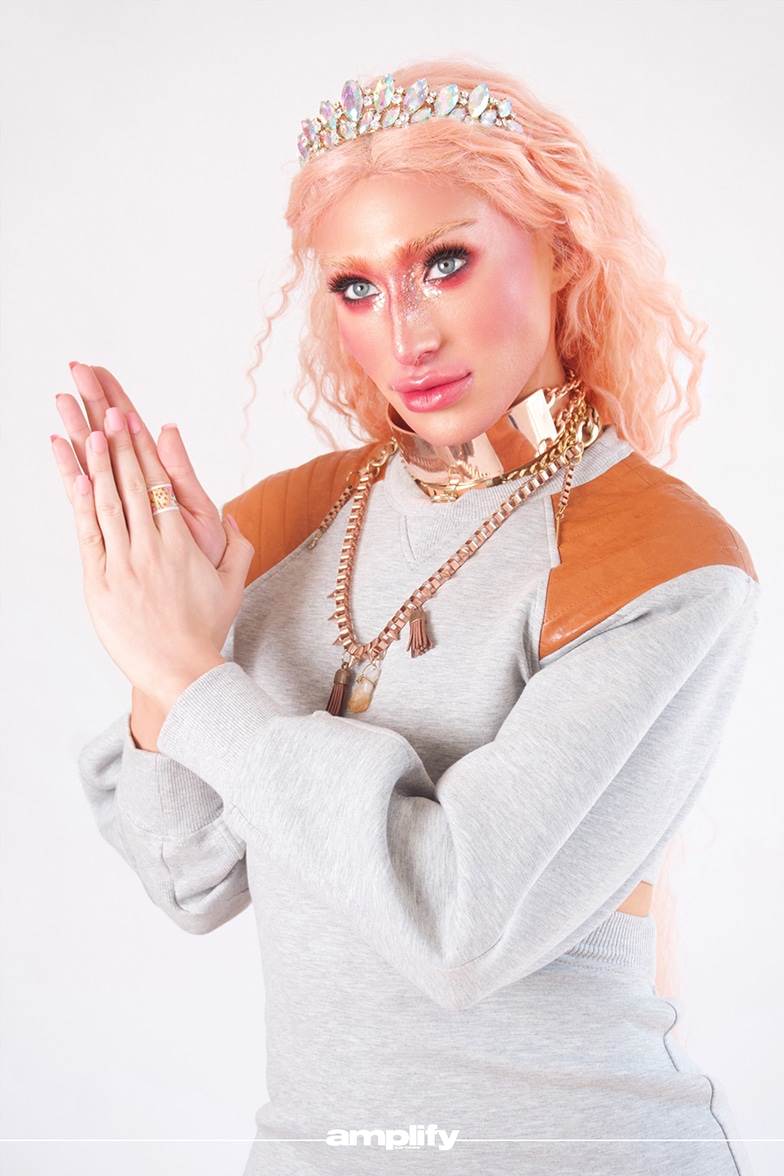
BibleGirl, self-described “internet reality trash” and pop culture-savvy meme queen, has paved her own way to notoriety without the help of RuPaul and her reality show behemoth. You’ll see her at DragCon alongside the A-list queens, and you’ll hear her name pop up in countless fandom discussions, but you’ll also see her poking fun at herself on social media – and probably stirring up drama there, too. “I would describe my drag as being an amalgamation of satire and irreverence,” she explains. “What I love to say is that I’m internet reality trash, which is such a weird combo of words but it’s just about being bright and loud and mixing patterns. A lot of my inspiration does come from early 00s pop culture, it’s that The Simple Life aesthetic of wearing weird off-the-rack stuff. I’m a goofball, so I want to let everyone in on the fun. I don’t think drag should be taken so seriously.” Search for her on Google, and the fourth result is a Reddit thread asking “Who the fuck is BibleGirl?” While many might take this as a negative, she’s taken the phrase and slapped it on a t-shirt alongside her face. It’s the perfect example of BibleGirl’s ability to insert herself into the joke, and how she just gets internet culture.
But behind this ‘Twitter troll’ persona, BibleGirl has created her own business empire. She’s got her own mobile game, BibleGirl’s Big Apple, which lets players live their drag fantasy and meet world-famous queens a la Kim Kardashian’s Hollywood app, and – perhaps most importantly – she’s the CEO of DragQueenMerch, a brand built from the ground up which has become the go-to destination for fans to buy merchandise of their favourite queens and kings. “I’m a believer in making people think you’re the shit by acting like you’re the shit,” says BibleGirl, “and I think everyone deserves to have their opportunity to market as they want to in an e-commerce world.” It’s this belief that’s formed one of the core values of DragQueenMerch. When pop culture fashion chain Hot Topic wanted to carry the line, BibleGirl insisted that they didn’t just stock the Drag Race girls, but a wide range of queens who also deserve a spotlight. “It all falls back onto my own experience, because that’s exactly what I was up against as someone who didn’t have a televised platform,” she continues. “One thing that’s always helped has been merchandising, so I never wanted to close that door on anyone who has big ideas and they just needs dots connected. I’ve always wanted to keep fighting for the little guy, because I was – and still am, to a degree – the little guy. I just think everyone should have a piece of the pie or the opportunity to show their shit off. We want DragQueenMerch to remain universal and accessible for anyone who comes on board. It should feel like a community.”
Drag is fast becoming big business, and branding is now almost essential to a queen’s success, especially in the age of social media. But as an art form with such deep roots in political activism and subverting societal norms – which historically has had the potential to offend those with more conservative sensibilities – is there a risk that drag will lose its message in favour of polished, palatable branding? BibleGirl doesn’t think so. “Branding is an important tool overall, and I don’t think it takes away the core of what drag is,” she argues. “I think it’s a very helpful tool to legitimise what someone’s respective drag is. For me, if I didn’t have the mechanics of branding, I’d just be another drag queen with a neon wig on, you know what I mean? And I don’t think branding has to take away from being political or being punk. I think there are plenty of girls who legitimately having their feet planted on both sides of the fence, people like Biqtch Puddin’ who is very active within the community, and very vocal about uplifting others, but she’s also branded herself so clearly that she’s some gutter-punk person from Georgia. The branding doesn’t have to be sleek, which is fun, it’s just characterisation after a certain point, and I think that’s what makes people fall in love because there’s a relatability factor and something exciting they can sink their teeth into. Branding can bolster a lot of longevity and stamina into a girl’s drag career, because there’s such a clear direction and fleshed-out concept.”
BibleGirl’s expertise in branding came in especially useful when a promoter refused to pay her for a two-week Australian tour, while the Drag Race girls on the same tour – BenDeLaCreme, Ongina and Morgan McMichaels – were reportedly paid in full. She started the hashtag #PayBibleGirl which went viral, with fans joining in to fight for her to get her dues. There was (of course) even merchandise produced. “It’s been sorted now in the sense that I’ve put it to bed. Some money was recovered but not an entire chunk of it. I got about a third in recovery of what I was owed,” she says. Despite the frustration and lack of payment, BibleGirl is choosing to focus on the positives. “My methodology with my drag has always been to take what the world has thrown at you as an obstacle, and try to twist it to be as much to your benefit as possible. Would I have loved to have been paid? Sure. But the experience itself, the girls I toured with, and the lifelong friendships and working experience I developed on that trip, along with the international press and headlines – it’s all quantifiable in one way or another.” There’s been a lot of noise made about the importance of paying talent – especially queer talent – of late. Why do people still feel they can get away with this behaviour? “I think it’s a layered issue, but mostly I think the core crux of the problem is that we have these men in power who have no idea what they’re doing,” BibleGirl says. “When they see feminine-presenting queer people, they think, ‘Ah, this is prey, this is someone I have an upper hand on’. They think they’ve got you figured out. And I think it’s a categorical trait just across the board, not even just in drag or queer culture. But no one ever gets away with it fully, and it always blows up in someone’s face.”
Some in the drag industry have criticised acts like BibleGirl by labelling them ‘social media queens’ or ‘bedroom queens’, with the implication being that they aren’t as genuine or talented as the artists that got their start in clubs and bars. But she embraces where she comes from. “I was a bedroom queen,” she says. “I was like 19 years old in college trying to figure out how to do it, just playing around in my room with drugstore makeup and learning how to be a queen online. My mentality is that we’re all on social media, so every drag queen is a social media queen. It’s borderline farcical to me sometimes.” She thinks the anonymity that the internet provides is why a lot of ‘social media queens’ get so much hate and disrespect. “There’s always that syndrome where people get comfortable hiding behind a phone screen to vocalise their opinions and they can delegitimise whatever they want because it’s removed and there’s not an immediate exposure in person where you get to know or understand the true intricacies of what they’re doing. I think that’s why a lot of people fall into that mindset. But I certainly don’t think it’s a delegitimate place to come from.”
It’s not just this new generation of ‘social media queens’ that have faced the brunt of old-school views and policing of what drag should be. Over recent years, we’ve seen attacks on AFAB queens – those are drag queens who were assigned female at birth – and trans individuals doing drag, even from the matriarch of the art form herself, RuPaul, who infamously said she wouldn’t let a trans woman compete on Drag Race. “I don’t think there should be any restrictions on what drag can be,” stresses BibleGirl. “We all thrive in this industry through some level of artifice. Nothing is real, that’s something drag has taught me, so when people get really hung up on who’s playing dress up or what they’re dressing up as, it’s just like, ‘Can’t we all just be friends?’ Isn’t that the whole point? What’s the point of creating this separatist thing as queer people? We’ve grown up in situations where we’ve not been allowed to be ourselves, especially as little gay boys in school – who was the one defending us if some guy was getting out of line and trying to play Mine’s Bigger Than Yours? A girl. It’s always women who have been strong figures for me, so why not have them be a part of the same conversation and party – or anybody, for that matter, because it doesn’t matter what the gender is. Throw a wig and some makeup on, and it all kind of falls away. I think because of the mainstream conditioning with Drag Race, its given people a specific lens of what they think drag is, or what it should be, and that’s been somewhat detrimental. I think that can all fall away by making sure that other people are included in spaces, and promoting as much inclusivity as possible.”
Like we’ve said before, it’s important that Drag Race isn’t seen as the be-all and end-all of drag as an art form, but still, it’s natural that fans will wonder why such a well-known name hasn’t been associated with the show in any way so far. When we spoke to her at DragWorld last year, BibleGirl said she had indeed auditioned for the show, but the response from producers left her turned off. “I’ve auditioned twice for Drag Race, per request of Drag Race, after then being told nothing and hearing radio silence,” she revealed at the time. “So I’ve come to my own conclusion that I don’t need it anymore, and I’m on my own.” A year later, does she feel any differently about the idea of being on the show? “I believe there should be room for other people to have that mainstream visibility,” she affirms. “I’ve gotten really lucky to be able to do what I’m doing, and I guess I get to be a bit of an anomaly. But I also like to be a spectator and see other people have their time to shine. It’s not that I don’t deserve it, but I think there are plenty of people who do deserve it who don’t necessarily have the means that I’ve been able to garner in this short amount of time.”
She’s also aware of the pitfalls that can come from appearing on a ‘reality’ TV show like Drag Race. While it can work wonders for a queen’s career, a bit of bad editing or a poor choice of words is all it takes to lead to a ‘villain’ label and a barrage of hate from viewers. We’ve seen it happen every season. “Drag Race can create this vacuum, this meteoric rise overnight to fame, and it can really shake people to their core. It’s not my bag. I enjoy being as D-list as possible. It’s just easier to navigate my life,” BibleGirl jokes. “But also, I think people can get really sick of you really quick when you’re broadcast so fervently on their screens or in a reality cycle, so to speak, where people turn you out through production. The machine of all of that doesn’t intimidate me as such, but it does scare me. The unknown is quite a lot. So I think a slow burn is good to keep building momentum, because my aspiration ultimately is to be successful, but I don’t have a direction of where I foresee that going, so I always want to just enjoy the ride. Doing that fastpass situation, I think I’d miss out on a lot of the little things, and that kind of bums me out a little.”
With so much success at such a young age, we ask BibleGirl where she sees her brand going over the years. “I see BibleGirl winning Drag Race every season, of course,” she laughs. “But beyond that, I just want to keep scaling the website further than drag, and I want to be known for creating an all-inclusive queer e-commerce portal, for queer entertainment at large and not just drag.” As far as her personal life goes, BibleGirl admits that she’s “kind of boring off the internet” and is very much a homebody. “I see myself still being very happy in Los Angeles being able to go to the beach and not sweat the little things, working out of my apartment on the website that is my little baby. My aspirations are that I want the BibleGirl brand continuing to go and scaling everything at a consistent pace that I have been. I like to keep people guessing. I don’t even know myself, I’m guessing half the time. I never know what’s round the corner. I just try to do it with a smile on my face.”
Photography Jonathan Ivan
Production and Styling Joshua Althina
Words Daniel Megarry










